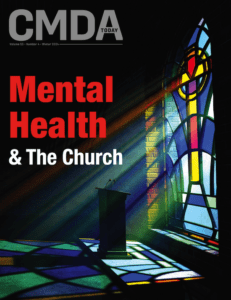What is Distinctive about Christian Ethics?
Being different can be dangerous, but we are called to be different. Our Lord told us doing so would bring persecution, but through those experiences, He would be with us, and we would be aware of it, and it would produce joy. Stephen was the first example, but it continues to this day.
Dr. John Patrick
In his journey to faith, my good friend, John Robson, wrote an opinion piece in the Ottawa Citizen entitled “Why Taking History Seriously Can Make You Very Cross.” I would add that this makes sense if you are a secularist, which he was at the time, but certainly not if you are a Christian. He went on to recognize the world was radically changed by the incarnation, even though the Roman authorities had no inkling or suspicion about it. That piece had a major impact on my thinking. Early Christians were different, and their neighbors noticed. They stood out, because they did things like caring in a way the world had never seen before (not practicing infanticide, in particular). My question is: Why are we not different now?
Early Christians were frequently martyred, and that is still happening today, of course, particularly in Muslim or secularist countries. Being different can be dangerous, but we are called to be different. Our Lord told us doing so would bring persecution, but through those experiences, He would be with us, and we would be aware of it, and it would produce joy. Stephen was the first example, but it continues to this day. Marginalization is the benign modern version, seen in attempts in the U.S. made by the liberal elite to replace the right to freedom of religion with freedom of worship—a transparent attempt to exclude Christianity from the public square, education and politics. Similarly, in other areas, of which bioethics is a specific example, marginalization of traditional Christian positions occurs. Originally called medical ethics, it has been taken over by otherwise unemployable philosophers of a skeptical, atheistic bent. A few Christians are allowed and even tolerated, as long as they skate around liberal idols, such as abortion; however, they have no influence on public policy. Meanwhile, the anointed elite use secular ethicists to legitimize bad behavior, as we have seen in Canada. Clearly unethical behavior by politicians has no serious consequences for them, but truckers demanding freedom from vaccine mandates can be scurrilously stigmatized and punished for peaceful protests. There were no smashed windows, no looting, no rioting in these protests, in total contrast to the liberal-approved protests we saw earlier in the pandemic.
Ethics courses, sensitivity training, etc. are all recent additions to public life, designed to deny serious attention to history and focus only on our personal feelings. We obsess over pronouns but neglect the bigger issues of freedom and liberty. Maybe the debacle and injustice of Vladimir Putin and Russian forces invading Ukraine will force us to repent and rethink. Given the current state of the world, it is not unreasonable to suggest we should think more seriously about history, particularly the reason America succeeded. In the 1770s, America did not lead the world in any way—now it does—but everyone knows that all is not well. Thoughtful academics like legal scholar Arthur Leff, philosopher Allan Bloom and Nobel Prize-winning economist Robert Fogel have all pointed to the falling standards of learning and, more importantly, ethics. Read Fogel’s book, The Fourth Great Awakening, to find out how a deep study of America’s history made the Nobel Laureate reassess the role serious faith has played.
We certainly have grounds to insist on the right to teach explicitly on the differences between Christian and secular ethics. Serious scholarship will lead to a re-ordering of our ethical priorities. Not all behaviors are equally important. Particularly in healthcare, we have a noble history of not running away from dangerous disease. First-century Greek physician Galen could not have understood such courage and moral nobility, as he was a pagan rationalist. As I write, the courage of Ukrainians facing the might of Russia is reminding us of our response to Germany and Japan in World War II, which contrasts dramatically with our liberal elite’s fearful response to COVID-19 while, nevertheless, using it as an excuse to increase the intrusive power of the state. How many of us have used the opportunity to remind our friends and colleagues, “…it is appointed unto men once to die, but after this the judgment” (Hebrews 9:27, KJV)? Moral courage is a rational outcome of being true followers of Christ. The secularist has only a vapid consequentialism, which leads to the what’s-in-it-for-me culture. Is it surprising we have weak politicians and suicidal or murderous teenagers?
The elevation of tolerance to the level of a virtue is a good example. We do not tolerate honesty, trustworthiness, courage or love. We honor these virtues. We tolerate bad things, moral slips, a little cheating, white lies, etc. The moral foundations of Western culture can be traced back to the Ten Commandments and the commentaries on them, beginning with the book of Deuteronomy, which is rarely a topic of serious expositional preaching, although frequently quoted by Jesus. The Ten Commandments can easily be rewritten as the ten divine intolerances! A stable society results when those intolerances are written on the heart. We used to know we are required to act justly, love mercy and walk humbly with our God (Micah 6:8). He did not define justice but simply asks us to be just as He is just.
Today, medical ethics are usually taught from the perspective of the Georgetown Mantra of Bioethics—autonomy, justice, beneficence and non-malfeasance—without serious discussion of why these, and not truth, are chosen and whether or not the order matters. C.S. Lewis foresaw the problems when he wrote The Abolition of Man in 1947. If every Christian healthcare professional could and would quote the book, healthcare would change. Here is a typical example which has been written on my heart, “For the wise man of old, the cardinal problem of human life was to conform the soul to objective reality (God) and the solution is wisdom, self-discipline and virtue. For the modern (man), the cardinal problem is how to conform reality to the wishes of men and the solution is a technique.” Nowadays, it would be the whole of technological science. Sadly, in his book, philosopher Alastair MacIntyre wrote, we are living After Virtue. We no longer know God’s Word as the source of the reasons for bearing our sorrows and performing our duties, as Allan Bloom said in The Closing of the American Mind (1987).
I would order the Georgetown Mantra biblically, which means turning the modern construction upside down, reminiscent of Acts 17. When the commandments are known and respected, at least grudgingly, by all within a community, then doors are not locked, women and children do not walk in fear, divorce is rare and the old are honored. Laws forbidding objective evil, such as murder, theft, etc., can be made, and from that negative base, the positive actions like love, mercy and respect can be understood. Although not capable of being framed into law, these actions can produce beneficence and provide a framework for justice. (Without a belief in divine judgment, though, there is no rational reason for judges to be impartial.) Autonomy that is not anarchic can be achieved only with these foundations. Nineteenth-century historian and politician Lord Acton wrote, “Liberty is not the power of doing what we like, but the right of being able to do what we ought.” Learning how to live as though we are not bound by sin but have the means to overcome it is Christianity’s gift to civilization.
The ethics of the epistles are simple—love and honor your spouse, care for your children and pay your workers. Each of Paul’s epistles approach a particular ethical problem by first teaching theology followed by injunctions, as above, but always rooted in a renewed mind. Ask your pastor every week which part of your thought processes he is trying to change. We are not quick to apply the idea of all being one in Christ Jesus. We still have a long way to go, but there has been progress over centuries.
Christian ethics are built upon the acknowledgement of being created by God, but we sinned, and God came in the form of Jesus Christ who set us free from the power of sin, so we can be prepared for eternal fellowship with Him. This biblical narrative is the basis for Christian ethics and is not compatible with secular ethics, and we should not pretend it is. Our intellectual elite are allergic to the question: In the beginning what or whom? But premises ultimately control outcomes, so if we get this wrong, the results are predictable. Secular ethics tacitly dismiss God, worship Darwin and, as Lewis vigorously expressed in The Abolition of Man, “We castrate and bid the geldings be fruitful.”
Author’s Note
John Robson is a historian, journalist and political commentator who writes for the National Post, a Canadian conservative daily newspaper, and is unashamedly Christian. He also has a website, climatediscussionnexus.com, and a YouTube channel with the same name. My colleagues and I run a discussion on ethics culture and faith during one week over the summer in Ottawa, Ontario. For details, visit Augustinecollege.org. We also specialize in teaching students how to survive attendance at a university while keeping their faith intact.



